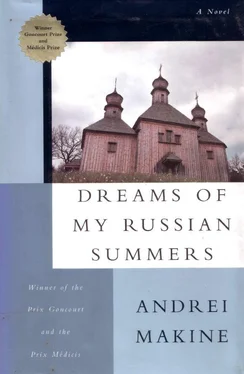In each of these classes I became one of them. My intermediate presence was appreciated by them all. There was even a time when I believed myself irreplaceable. Thanks to… France.
For, cured of France, I now dined out on her. I was happy to be able to pass on my whole stock of anecdotes, accumulated over the years, to those who had now accepted me among them. My stories found favor. Battles in the catacombs; frogs' legs paid for in gold; entire streets in Paris devoted to the sale of love – these subjects earned me the reputation of an established storyteller.
I talked, and I felt my recovery to be complete. The bouts of that madness that had earlier plunged me into the vertiginous sensation of the past did not recur. France became simply a source of stories – entertaining and exotic in the eyes of my fellow pupils, arousing when I described love à la française, but overall little different from the funny and often smutty stories that we told one another during the breaks, as we puffed on our hasty cigarettes.
I noticed fairly quickly that it was necessary to season my French stories according to the tastes of my listeners. The same story would change in tone according to whether I was telling it to the "proletarians," the "tekhnars," or the "intellectuals." Proud of my talent as a raconteur, I varied genres, adapted my style, chose my words. Thus, to please the first group, I dwelled at length on the torrid frolics of the president and Marguerite. A man, and what's more a president of the Republic, who died from too much lovemaking – this picture alone had them in ecstasy. The tekhnars , on the other hand, were more interested in the twists and turns of psychological intrigue. They wanted to know what happened to Marguerite after her erotic masterstroke. So I talked about the mysterious double murder in the impasse Ronsin; about that terrible May morning when Marguerite's husband was discovered, garrotted with the aid of a curtain cord; and likewise her mother-in-law, also choked, but on her own false teeth… Nor did I fail to point out that her husband, a painter by profession, had been overwhelmed with official commissions, while his wife had never forgone friendships in high places. According to one version, it was one of the late Félix Faure's successors, evidently a minister, who had been surprised by her husband…
As for the intellectuals, the subject seemed to leave my new friends cold. Some of them even yawned from time to time, to show their lack of interest. They only abandoned this assumed indifference when they found a pretext to make a play on words. The name of French President "Faure" quickly fell victim to a pun: in Russian, giving foru means giving odds to a rival. The laughter, knowingly blasé, erupted. I realized that the language spoken in this narrow circle was made up almost exclusively of twisted words, punning riddles, camp remarks, and turns of phrase known only to its members. With a mixture of admiration and anguish, it became clear to me that their language had no need of the world about us, the sun, the wind. And I was soon contriving to imitate these word jugglers with ease…
The only person who did not appreciate my turnabout was Pashka, the dunce, whose fishing expeditions I once used to share in. From time to time he would approach our group and listen to us, and when I embarked on telling my French stories he would stare at me with a suspicious air.
One day the gathering round me was more numerous than usual. My story must have been particularly interesting. I was talking (summarizing the novel by that poor Spivalski, who was accused of all the mortal sins and killed in Paris) about the two lovers who had spent a long night in an almost empty train, fleeing across the dying empire of the tsars. The next day they parted forever…
On this occasion my listeners belonged to all three castes – sons of proletarians, future engineers, and intelligentsia. I described the passionate embraces in the depths of a sleeping compartment as the train hurtled through dead villages and over burned bridges. They listened to me avidly. It was certainly easier for them to picture this pair of lovers in a train than a president of the Republic with his beloved in a palace… And to satisfy the aficionados of wordplay I described the train stopping in a provincial town: the hero lowered the window and asked the few people who were walking alongside the track what the name of the place was. But no one could tell him. It was a town without a name! A town peopled with strangers. A sigh of satisfaction arose from the group of aesthetes. And then in a cunning flashback, I returned to the compartment, to talk again of the restless love of my crazy travelers…
It was at that moment that above the crowd I saw Pashka's tousled head appearing. Pashka listened for several minutes, then growled, easily drowning my voice with his rough bass. "You've got these fools with their tongues hanging out over your pack of fibs!"
No one would have dared to contradict Pashka in a solo confrontation. But the crowd has a courage of its own. Snorts of indignation came in response.
In order to cool tempers I said in a conciliatory tone, "They're not fibs, Pashka! It's an autobiographical novel. This guy really did escape from Russia with his mistress after the Revolution, and then in Paris he was murdered…"
"Right. So why don't you tell them what happened at the station?"
I was left openmouthed. Now I remembered having already told this story to my friend, the dunce. In the morning the two lovers had found themselves beside the Black Sea, in a deserted café, in a town buried in snow. They drank scalding tea by a window covered with hoarfrost… Several years later when they met again in Paris they admitted to one another that those few hours that morning were more dear to them than all the transports of love in their lives. Yes, that dull, gray morning; the muffled sounds of the foghorns; and their complicit presence at the height of the murderous storm of history…
It was that station café that Pashka was speaking of… The school bell rescued me from my embarrassment. My listeners stubbed out their cigarettes and streamed into the classroom. While I, abashed, told myself that none of my styles – not the one I adopted when speaking to the prolos , nor the one for the tekhnars , nor even the verbal acrobatics that the intellectuals adored – no, none of these ways of speaking could have recreated the mysterious charm of that snowy morning on the edge of the abyss of the times. The light, the silence… Furthermore none of my fellow students would have been interested! It was too simple: without erotic attractions, without intrigue, without wordplay.
As I went home from school I remembered that when telling my comrades the story of the French president in love, I had never yet spoken of his silent vigil beside the black window at the Elysée. He alone, facing the autumn night, and – somewhere out there in that world of darkness and rain – a woman with her face hidden beneath a veil that sparkled with mist. But who would have listened to me if I had ventured to speak of that moist veil in the autumn night?
Pashka tried again two or three times, and always clumsily, to tear me away from my new friends. To no avail. One day he invited me to go fishing on the Volga. I refused in the presence of everybody, with a vaguely scornful air. He remained for several seconds in front of our group-alone, hesitant, strangely frail despite his broad shoulders… On another occasion he caught up with me on the journey home and asked me to bring him Spivalski's book. I promised I would. The next day I had forgotten all about it…
I was too absorbed in a new collective pleasure: the Mountain of Joy. That was the name given in our city to an enormous open-air dance floor situated on the summit of a hill high above the Volga. We scarcely knew how to dance. But it was clear that our rhythmic gyrations had only one objective: to hold a girl's body in our arms, to touch it, to tame it. On our evening excursions to the Mountain, castes and coteries no longer existed. In the feverishness of our desire we were all equal. Only the young soldiers on leave formed a group apart. I observed them jealously.
Читать дальше












